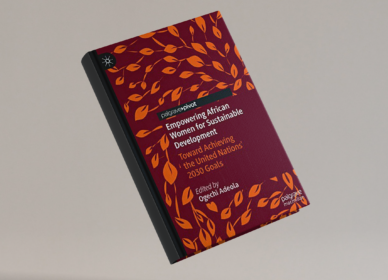
Africa has a long history of conducting businesses embedded in social networks, entrepreneurial activities and business clusters. Prior to the western colonization in all spheres of the African structural system, the continent had its own traditional cultural and business systems upon which its nations were built. In a search for an Africa-centric model, it is time to look inward and consider indigenous entrepreneurial theories, philosophies and practices to engineer our development. This Series aims to explore successful indigenous African Enterprises, covering business methods, trade practices, talent management, entrepreneurial incubation, financial practices, family businesses and succession planning, and sales and marketing practices. The first in the Series is The Igbo Traditional Business School (I-TBS), premised on the very successful socio-economic model of empowerment practised by the Igbos of south-eastern Nigeria.
The Igbo Traditional Business School (I-TBS).
I-TBS is fully discussed in the new book, Indigenous African Enterprise: The Igbo Traditional Business School, Published by Emerald Publishing Limited, UK (December 2020)
Buy a copy on Amazon
Buy a copy on Emeraldinsight
https://books.emeraldinsight.com/page/detail/Indigenous-African-Enterprise/?k=9781839090349
Download Sample Chapter
https://books.emeraldinsight.com/resources/pdfs/chapters/9781839090349-TYPE23-NR2.pdf
Making History
On December 14, 2020, the book was finally out – A dream that came true. We did it! Twenty-nine authors embarked on this journey with me over a year ago to document the entrepreneurial process, practices and business heritage of the Igbos of south-eastern Nigeria for posterity and as a launchpad for portraying the uniqueness of this Africa’s indigenous enterprise.
This book examines an indigenous Africa-centric business model practised by the Igbos of south-eastern Nigeria for decades. It traces the origins, development, and key themes of the business practices of Nigeria’s south-eastern Igbos, including apprenticeships, entrepreneurial clusters, sales practices, conflict management, talent recruitment, indigenous financial practices, locally-generated venture capital, family businesses, and succession planning. The unique framework and rules of operation, collectively referred to as the Igbo-Traditional Business School (I-TBS) in the book, and, if well-positioned, can make positive contributions to Africa’s social and economic advancement.
The Igbo Traditional Business School (I-TBS) is not a conventional academic institution as it operates outside the classroom. Though without a library, or even an address, its tradition of lifelong entrepreneurial learning is an important area to explore. Igba-boi, the principal constituent of I-TBS and fundamental economic norm for Igbo society, prepares young adults for the working world through mentorships or apprentice relationships with established traders or businesspeople. At the heart of this system are family businesses, entrepreneurial incubators and clusters, and informal loose agencies or affiliates (igba-oso-afia)
Also featured is an analysis of Igbo businesses in South Africa to illuminate the understanding of the model, a comparison with the German model discussed, as well as recommendations for institutionalising these indigenous practices across Africa.
Foreword
The Foreword by the erudite Prof Azubuike Sonny Nwankwo, FCIM, FRSA, FHEA, former Academy Provost, Nigerian Defence Academy, Kaduna; Emeritus Professor, University of East London, UK and Inaugural President, International Academy of African Business & Development
Endorsement
And the back page endorsement? None other than the distinguished Dr Cosmas Maduka.
“A fascinating intellectual discourse on one of Africa’s most successful business models of which I am a proud beneficiary. – Dr Cosmas Maduka (CON), Chairman/CEO, Coscharis Group
About the Editor:
Ogechi Adeola is an Associate Professor of Marketing and Head of Department of Operations, Marketing and Information Systems at the Lagos Business School, Pan-Atlantic University, Nigeria. Her co-authored papers won Best Paper Awards at international conferences in 2016–2019, consecutively.
The Igbo Traditional Business School (I-TBS) Series
Watch out for the Igbo Traditional Business School Series, coming up in April 2021, featuring authors discuss the traditional business model, and relating and adapting it to develop sustainable enterprise in Africa.
Book Content
Foreword by Azubuike Sonny Nwankwo
Part A. An introduction to the Igbo Traditional Business School (I-TBS)
Chapter 1. The Igbo Traditional Business School (I-TBS): An Introduction; Ogechi Adeola
Chapter 2. Igba-Boi: Historical Transitions of the Igbo Apprenticeship Model; Adebukola E. Oyewunmi, Olabode A. Oyewunmi, and Chinonye L. Moses
Chapter 3. Entrepreneurship Incubation Among the Nigerian Igbos: The Íǥba-Bọị Indigenous Model; Anayo D. Nkamnebe and Esther N. Ezemba
Chapter 4. The Igbo Traditional Business School (I-TBS): A SWOT Review Synthesis; Ishmael Obaeko Iwara
Part B. Indigenous Business Management and Succession Planning
Chapter 5. Family Business, Succession Planning and Survival Strategies; Okey Nwuke, Chiz Nwoye, and Nnaemeka J. Onoyima
Chapter 6. Talent Management and Succession Planning in Traditional Igbo Businesses; Chidi Okoro and Nkemdilim Iheanachor
Chapter 7. Talent Recruitment, Knowledge Management and Business Performance: A Case Analysis of Igbo Traders in Lagos State; Ngozi Ann Chikere, Adenike Aderonke Moradeyo, and Isaiah Adisa
Part C. Financial Practices, Sales Negotiation and Conflict Management
Chapter 8. Cultural Practices in Sales Negotiations: Insights from the Indigenous Igbo Trade Practice; Uche Attoh, and Ademola Ajeyomi
Chapter 9. Understanding the Conflict Management and Transformation Mechanisms in the Igbo Traditional Business Model; Silk Ugwu Ogbu
Chapter 10. Indigenous Financial Practices of Igbo Micro-Entrepreneurs in Lagos; Ogechi Adeola, Uchenna Uzo, and Adedeji Adewusi
Part D. Business Incubators and Models
Chapter 11. Indigenous Business Incubators: A focus on the Akwete Weaving Industry; Victoria Okafor, Ogechi Adeola, and Afam Ituma
Chapter 12. Mutual Aid Economy: Exploring the Locally-Generated Venture Capital Approach In Igbo Business Industrial Clusters; Awele Achi and Francis Achi
Chapter 13. Nollywood: Exploring the History and Indigenous Distribution Structure of the Igbos; Ngozi Okpara Chapter 14. Profiling the Socio-Cultural Attributes of Igbo Business Incubation in Diaspora: The South African Experience; Kingsley Ekene Amaechi
Part E. Recommendations for Policy and Practice
Chapter 15. Igba-Boi: Comparison with the German Model and Recommendations for the Nigerian Economy; Obinna Ikwuegbu, Oluyemisi Bolade-Ogunfodun, Kola Yusuff, and Bernd Vogel
Chapter 16. The Igbo Business Practice: Towards a Model for Africa – Conclusion and Recommendations; Ogechi Adeola


